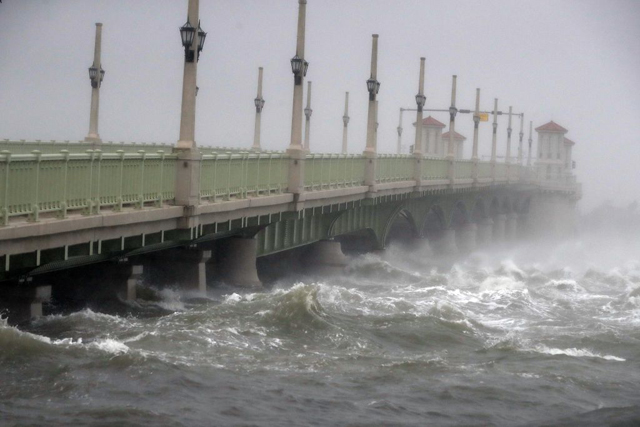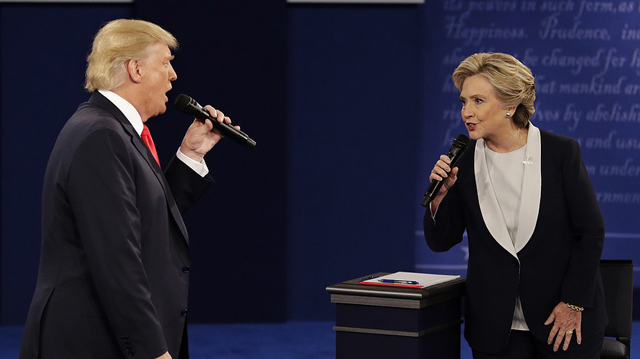Republicans head for the exits as Trump’s campaign goes into meltdown

A coastal bridge at St Augustine, in north-coastal Florida, as Hurricane Matthew passes offshore on 7 October. PHOTO Minneapolis Star Tribune
Four years ago this month a US presidential election campaign was brought to a halt as Hurricane Sandy smashed into New York and New Jersey, leaving death and devastation in its wake.
That exceptional storm brought climate change into the election debate and lent impetus to Barak Obama’s final-term executive measures to cut carbon, in defiance of a recalcitrant congress.
The 2016 campaign has been marked by Hurricane Matthew’s deadly late-season rampage through the Caribbean and southern states, but this was to be no repeat performance. The country’s commercial heartland was spared when Matthew veered out to sea.
Hillary Clinton and Donald Trump have so far spent 4½ hours debating each other about all manner of things including the economy, foreign relations, defence, health insurance and (mainly) the moral bankruptcy of their opponent. But there’s been barely a whisper about climate change.
The world’s biggest issue got just one oblique reference in a single question in the last debate: “What steps will your energy policy take to meet our energy needs, while at the same time remaining environmentally friendly and minimising job loss for fossil power plant workers?”

Donald Trump and Hillary Clinton in the second presidential debate in St. Louis, Missouri on 9 October. PHOTO AP/John Locher
“Remaining environmentally friendly” was the questioner’s way of avoiding the dreaded c-word. Trump answered in that spirit, saying nothing about climate while attacking Obama for putting coal energy “under siege” and Clinton for policies that he said would destroy miners’ jobs.
Clinton did say she would fight climate change – “a serious problem” – while creating “millions of new jobs and businesses” in renewable energy to make the US a “clean-energy superpower”. But that was it. No follow-up questions, no candidates’ responses to what the other had said.
The question reflects ambivalence out in the wider US population. A recent study published in the journal Environment, led by Oklahoma State University sociologist Riley Dunlap, found Americans’ attitudes to climate change had polarised over the past decade.
Dunlap’s team found that from relatively close cross-party positions in 2008, only 43 per cent of Republicans now think humans change the climate while 84 per cent of Democrats do, and less than a quarter of Republicans feel threatened by climate change compared to over half of Democrats.
Standing beside Clinton on a Florida stage last week, former vice-president and climate campaigner Al Gore played up the differences between the parties and their respective candidates.
Voters had an “extremely clear” choice in 2016, he said. “Hillary Clinton will make solving the climate crisis a top national priority. Very important. Her opponent, based on the ideas that he has presented, would take us toward a climate catastrophe.”
He didn’t mention that Clinton’s interest in climate policy had been lukewarm, to say the least, until challenged by Bernie Sanders. But at least she’s now talking about it, coherently and with apparent conviction. Trump is another story altogether.
Clinton’s well-documented flaws pale into insignificance against Trump’s unsavoury personal attributes, not least among them his threats against Clinton and his attitude to women.
Equally disturbing is his failure to grasp public policy. Questioned on policy detail during the debates, Trump repeatedly drifted into irrelevant, often-incoherent ramblings or personal attacks on his opponent. Policy, he seemed to say, is not something a leader need bother about.
Four years ago Trump wrote that “the concept of global warming was created by and for the Chinese in order to make U.S. manufacturing non-competitive.” He recently called the Paris climate talks “ridiculous” and says he will repudiate the agreement as President.
Such threats seriously destabilise this delicately-balanced international agreement, with big long-term implications for the world, but it’s the mark of the man and of the party that nominated him.
With three weeks still to go in this extraordinary campaign Trump can’t be written off, but advocates for climate action are pinning hopes on opinion polls that put Clinton well ahead. For their part, Republican congressional candidates are turning their backs on their purported leader, in a desperate effort to salvage their own campaigns.
The Republicans are now in a crisis of their own making. Trump is the end product of a kind of mindless libertarian populism that drove the party to the right in the 1990s and captured it entirely during the Obama presidency. Now they face some shattering consequences.
So do we all. When a major party fails, the biggest loser is democracy.
